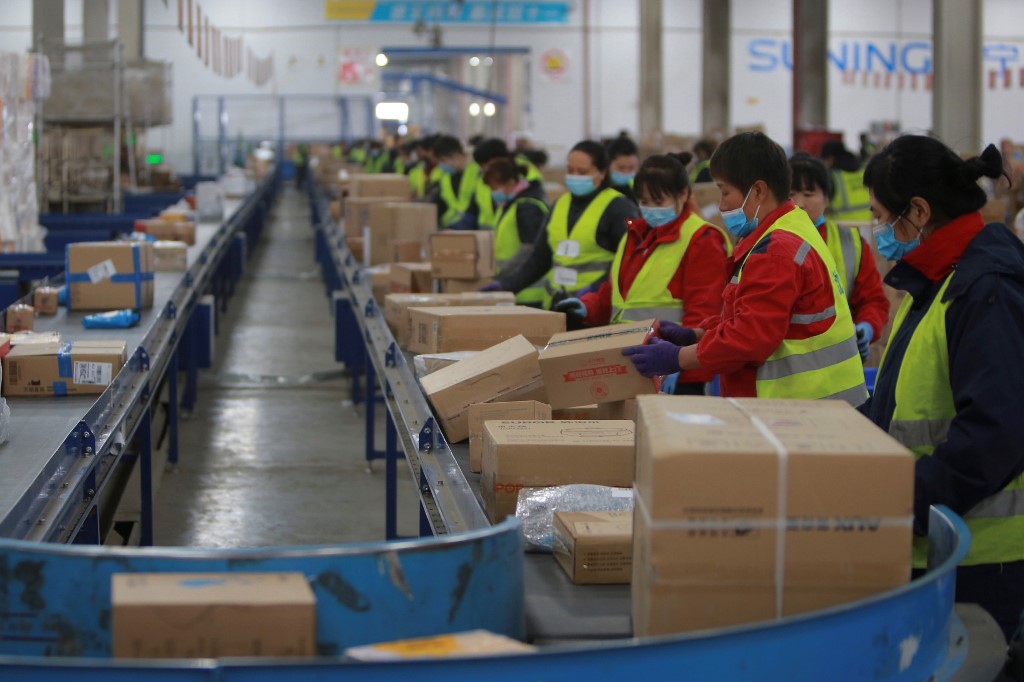(ATF) Millions across China stocked up their online shopping carts in a race to snag the best deals on Singles Day – an annual shopping extravaganza that takes place on November 11 each year.
Popularised by Alibaba Group Holdings as the “11.11 Global Shopping event”, Singles Day is the world’s largest retail festival. This year, Alibaba raked in a record-breaking 498.2 billion yuan ($74 billion) in sales – suggesting a robust recovery in the world’s second-largest economy.
The festival has traditionally been marketed as an opportunity for singletons to splurge on themselves, but this year, the appetite for spending is more ferocious than ever, as China sees the other side of the pandemic.
“The consumer habit and the time they spend online versus offline has taken another structural change during the coronavirus,” says Lina Choi, Vice President of Moody’s Investors Service. “Not only are people buying goods, they are also increasingly consuming internet services. Everything is being ordered and settled online. We believe that this structural change is here to stay.”
According to a study done by AlixPartners, consumers are less likely to buy imported goods and are focusing more on local brands.
Local brands
“Local brands have also earned consumer trust from past few years with good quality of products, modern and sleek design, innovative marketing campaigns,” Xiaofeng Wang, a senior analyst at Forrester, said. “In addition, local brands are more competitive in price as well, so it makes sense that local brands are getting popular.”
Fresh food, healthcare and medical products would see record sales numbers, according to Alix, reflecting concerns for the impending winter season and a potential second wave.
Extended sales periods and plenty of discounts played a large part in mobilising consumer traffic, too. At the beginning of the month, Alibaba added an extra three-day sales window to boost transactions – a natural strategy to support businesses that have been hit hard by the coronavirus pandemic. Within the first half-hour of this year’s event, the transaction volume surpassed last year’s total sales of 268.4 billion yuan.
On Thursday, rival JD.com announced it had also set a new sales record of 271.5 billion yuan ($41 billion), after extending its sales period to two weeks. As ordinary life resumes in China, the event also gained traction at brick-and-mortar retailers across the country and parts of Southeast Asia.
Choi added that the formats of this year’s Singles Day are more diversified than ever. “Short videos, direct broadcasts – these newer and more virtually connecting formats – they have always been in place but take a much more important role in driving the growth during Singles Day this year,” she said.
Chinese consumers, who are among the top demographic to travel and spend on luxury goods, have been saving throughout the pandemic and Singles Day grants them the one chance to dig into deep discounts.
The country has recorded a 4.9% economic growth over the third quarter and will record higher figures in the next period as spending in China has not just rebounded but allegedly surpassed pre-pandemic levels.
But despite also having taken part in the festivities, brick-and-mortar stores are in the decline. “Online part of consumption takes a much faster pace in the recovery,” says Choi.
E-commerce rising
“Some consumers, especially the older generation, started shopping online for the first time because of Covid-19, and the new habit will likely say,” says Wang. “Of course, consumers went back to shop offline given that the pandemic is well contained in China, but the overall trend is the share of e-commerce is going to increase year-by-year and was accelerated because of Covid-19.”
This year’s festivities also occur as Alibaba grapples with a new set of regulatory issues imposed by Beijing.
Regulators
On Tuesday, China’s anti-trust watchdog announced that it would be drawing up a new anti-monopoly regulations to curb the power of internet giants. The law will target online retailers and requires that they operate exclusively on one company’s platform. The draft guidelines also aims to get rid of competition practices.
In response, Alibaba’s Hong Kong-listed shares fell more than 14%, which JD.com dropped 17%. Meituan, China’s biggest local services platform, took a hit of 16% and Tencent Holdings dipped 11%.
“Regulatory chains and control are not new and many of these companies have experience working with regulators at different times,” says Choi. “The endgame is to try to foster more competition and more sustainable growth in the long term. If they are leading players, they will probably face barriers trying to expand their market share.”
In the global arena, China appears to be one of the only consumer markets to have rebounded from coronavirus pandemic, although there is skepticism about the why the National Bureau of Statistics ‘cherry-picks’ positive data.
“Brands in the West may want to jump on the Singles’ Day bandwagon and try to sell to Chinese consumers through cross-border e-commerce platforms.”
























